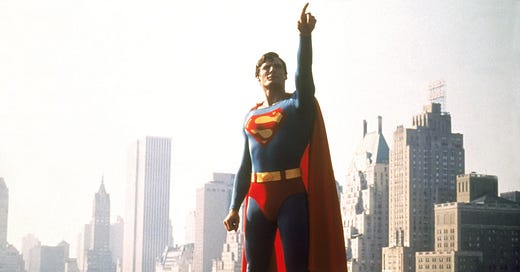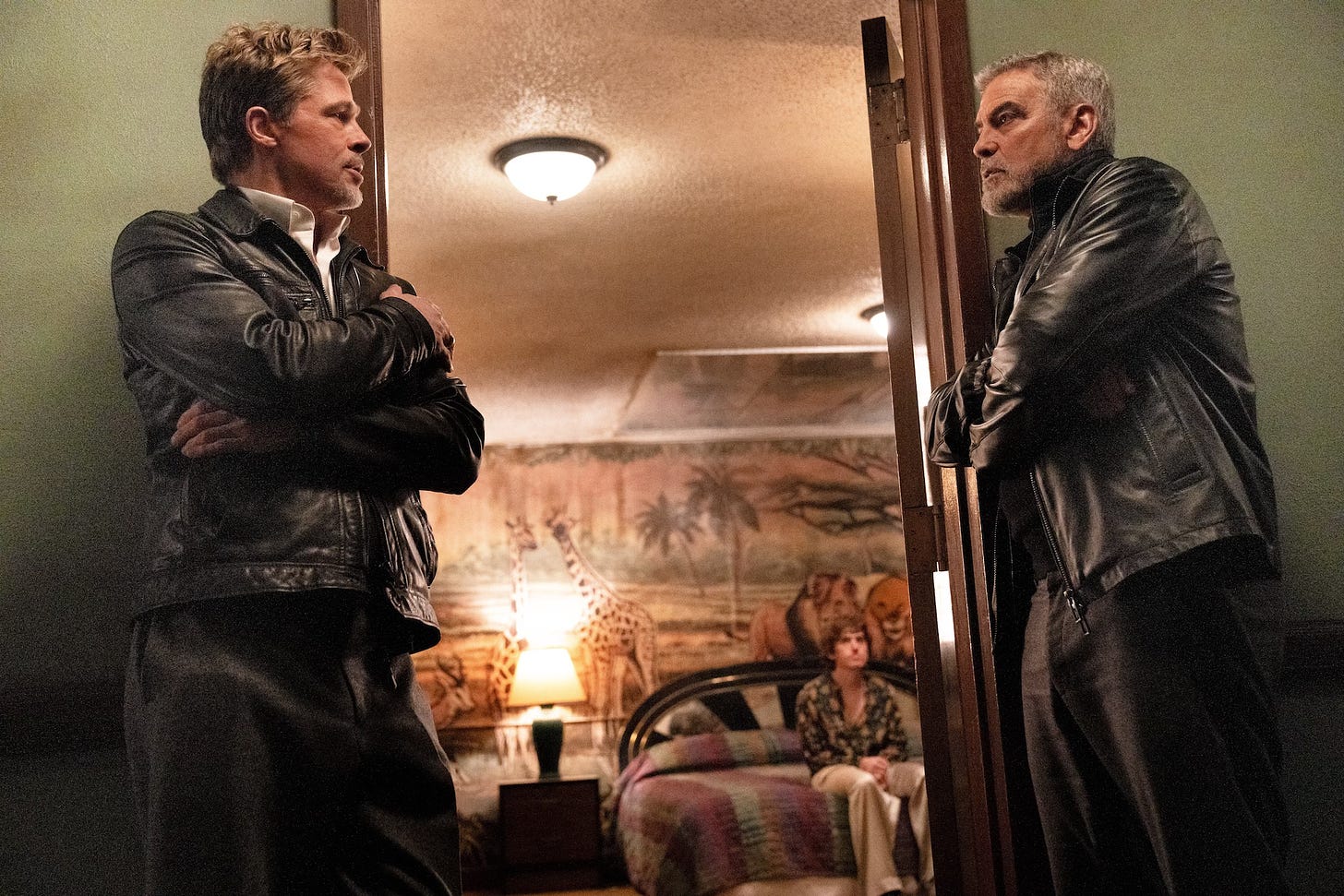How 'Super/Man' Flies Above Cynicism
The new documentary about Christopher Reeve feels like an antidote superhero fatigue.
Going into Ian Bonhôte and Peter Ettedgui’s documentary Super/Man: The Christopher Reeve Story, I had two primary concerns. The first is that we were in for a basic hagiography that failed to elucidate anything about the actor but was simply a useful bit of puffery that treated Christopher Reeve with kid gloves as it got audiences ready for next year’s Superman reboot. The second concern was that it wouldn’t go past the obvious irony that the man who played the Man of Steel suffered an injury that rendered him a quadriplegic. Thankfully, Super/Man addresses both concerns and soars above them to show the heroism in the basic humanity of a famous figure.
Given our current glut of superheroes, I’m unsure if younger audiences can comprehend what it was like to lose Reeve on screen. Superman had trapped him a bit into an iconic role despite his clear talent and dedication to playing a variety of roles (this is where I’ll plug Sidney Lumet’s excellent 1982 thriller Deathtrap). But before he could establish himself beyond the Last Son of Krypton, he broke his neck while horseback riding in 1995. For someone who not only played Superman but valued an active lifestyle as well as working in an industry that wasn’t exactly brimming with roles for physically disabled actors, this seemed like the end for Reeve. Audiences were understandably heartbroken because of the impact he made on their lives. Superman was the biggest movie of 1978, and while George Reeves had played the role on screen prior, Reeve came to define it in full-color glory. To quote the poster, he made us believe a man could fly. The character wasn’t just a part of a franchise machine; he meant all that was good in the world channeled through Reeve’s committed performance.
When Reeve hung up the cape after 1987’s Superman IV: The Quest for Peace, he seemed like he was about to embark on a new chapter in his life. Instead, fate dealt him a different hand, and it would have been easy to fall into bitterness and resentment. Instead, Reeve, with the support of his family and especially his wife Dana, kept going. He found a way to not only live with his disability but create a foundation for disability research and advocacy while still embarking on creative pursuits with renewed vigor.
Wisely, the film doesn’t try to paint a portrait of a perfect Christopher Reeve, and even by his admission, he’s far from Superman. A child of divorce with a father who never seemed impressed by his son’s accomplishments, the film doesn’t shy away from how that impacted Reeve’s romances and fatherhood. He had a tumultuous relationship with his partner, Gae Exton, which led to strained relations with their two children. Nor did his disability suddenly render him morally invulnerable, as one disability advocate notes. There is a divide in the community between those who want societal change for the disabled and those like Reeve, who are more focused on curing paralysis. That doesn’t make Reeve evil or wrong; it makes him human.
And humanity is what makes the documentary work. Rather than limiting the story with obvious tragic irony or trying to build Reeve into a real Superman, Bonhôte and Ettedgui tell a story that’s wonderfully common: a family coming together in the face of adversity. The Reeve family may have had more financial resources, but it’s not like they had a bottomless pit of money. And no amount of money can wash away a father who knows he’ll never have a catch with his three-year-old son or a husband knowing he’ll never make love to his wife again. But in the face of these difficulties, the Reeve family became stronger, and that’s as inspiring as any superhero tale.
I’d like to believe that if a similar tragedy befell any of the actors playing a superhero today, there would be a similar outpouring of support from fans; that simply because there are many more cinematic superheroes than there were in 1978, that doesn’t mean those characters don’t touch people’s lives. But all the superheroes now don’t diminish what Reeve brought to the genre and how, rather than letting the role define him, he defined the role through the basic decency and tireless effort of how he lived his life. Superman made us believe a man could fly; Super/Man makes us believe in so much more.
Super/Man: The Christopher Reeve Story recently played in theaters as part of a two-night Fathom Events showing. It will likely be on Max later this year.
Recommendations
There are slasher movies that don’t hold up anymore. The original Friday the 13th is a neat curiosity, and it was influential in the genre, but overall, it’s kind of a dull feature that’s more important for what it launched than what it is. Compare that to Wes Craven’s A Nightmare on Elm Street, which remains a total blast. The creativity on display here is ingenious, and you can see why it cemented Craven as a singular director in horror cinema. The film arrives on 4K on October 15th, and you can currently pre-order it for $23.79 (30% off).
[Note: I receive a small percentage of sales made through my Amazon Associates links]
What I’m Watching
Will & Harper
I loved this documentary about Will Ferrell taking a road trip with his longtime friend Harper Steele, who recently transitioned to a woman. While the concept seems like the high concept that would fit a Ferrell comedy, this is a heartfelt and lovely celebration of not only a friendship that was forged back in the mid-90s when Will and Harper joined Saturday Night Live (Will in the cast and Harper as a writer who would pen such legendary sketches as “Oops! I Crapped My Pants”), but it’s also a look at the anxiety of being trans in America. But since this is a movie featuring two very funny people, you also get quite a few laughs along the way.
It rankles me that Netflix as a platform simply wants to play both sides here and throw up its hands to say, “Well, here’s a documentary showing the full humanity of a trans person, but if Dave Chappelle or Ricky Gervais want to mouth off with some more tired jokes that dehumanize trans people, then hey, who are we to judge.” I’m not sure Netflix would be as comfortable with that kind of humor about another minority, but because the trans community is small and, therefore, lacks political power, they make for an easy target. This makes life a lot harder for people like Harper, who only want to enjoy the same freedoms as other Americans.
What you get in Will & Harper isn’t an attempt to chastise bigotry (although that’s certainly here, and I felt enraged at people who were taking shots at this perfectly nice woman), but an attempt to show allyship. Ferrell is a celebrity, but he wants to use that celebrity to protect his pal. There’s never a moment where Ferrell crows, “Look how tolerant I am!” Instead, he berates himself for moments where he could have been a better friend. Seeing that love on screen is what we need. We may not be able to change hearts and minds, but we can endeavor to be better friends. That starts not by making ourselves the star but by listening to Harper and people like her.
Will & Harper arrives on Netflix on Friday, September 27th.
Wolfs
I’ll have a lot more to say about this one on Sunday in terms of Apple’s confounding release strategy, but as for the movie itself, it’s a delight. If you had released this twenty years ago, it would have been one of the biggest hits of the year, and stars George Clooney and Brad Pitt have lost none of their charm or charisma. In the film, they play two unnamed fixers tasked with disposing of a dead body that turns out not to be all that dead. As the long night of cleaning up a mess presents more obstacles, two guys who pride themselves on their unique set of skills are forced to realize they may not be the lone wolves they thought they were.
I was a bit wary of this one because I thought Jon Watts, who helmed the recent Spider-Man trilogy, was going to end up like other Marvel directors who make hits for the studio before making dreck for a streamer (see The Russo Brothers). I also wasn’t a big fan of his pre-Marvel movie, Cop Car. But Wolfs, which Watts also wrote, shows a director finally getting to flex and having a clear idea of the darkly comic thriller he’s crafting. The movie looks great, it’s unafraid to show its influences (I don’t think it’s a mistake that Austin Abrams is channeling a bit of Griffin Dunne in After Hours), and it knows to trust its iconic leads.
Clooney and Pitt are always great together, and while there’s a bit of friendly sniping between their characters in the Ocean’s movies, here it plays more like two divas fighting for the spotlight. Some films benefit from the baggage the actors bring, and Wolfs shines in part because you have two of the most famous actors for the past few decades donning egotistical performances and poking fun at their self-importance. Studios may want to place all their chips on IP, but a movie like Wolfs is a reminder that movie stars aren’t just a marketing tool. When used correctly, movie stars can be an essential element of a film’s artistic success.
Wolfs arrives on AppleTV+ on Friday, September 27th.
What I’m Reading
I finally finished reading A Clockwork Orange, a book I’ve had on my reading pile for about twenty years or so. I finally picked it up after rewatching the movie, and while this may be a bit of blasphemy, I think the movie’s a little better! Having characters speak the slang makes the narrative flow better (even though I respect Burgess’ use of slathering on the slang to bring you into both Alex’s mind and the world he inhabits), and Kubrick has a much stronger ending.
I’ve now moved on to Character Limit: How Elon Musk Destroyed Twitter by Kate Conger and Ryan Mac, and it’s the kind of book I’m going to tear through. I was an extremely heavy Twitter user for over a decade, and so I’m fascinated by what happened to the company between 2015-present. What I like so far is that this isn’t just “Elon Musk Is a Big Dummy” (although that’s certainly present, and I’m here for it), but a useful look at business maneuvering for a major company. For all the financial compensation these C-suite guys receive, they miss pretty obvious things. For example, they thought giving Musk a board seat would rein him in and stop attacking the company on Twitter. Maybe thinking is different in Silicon Valley, but as an outsider, it seems like you’d have to be pretty blinded by wealth not to see the glaring flaws in Musk’s character. To also hide behind, “Well, look at the success of Tesla and SpaceX!” also belies the thinking that these titans of industry can do anything, which is ridiculous. It may not be solely luck, but it’s also thinking that success in one business will translate to any business. Again, ridiculous.
In other reads:
White-Collar Workers Are Getting Squeezed. Even Oscar-Winning Producers. by Noam Scheiber [The New York Times] - Before you brush this off as “Boo-hoo, the wealthy movie producers,” give this a read. It’s not simply a matter of people in the industry now facing new struggles, but yet another story about how the kinds of films that get made are now shrinking. We’re in an extremely rough period of filmmaking right now, thanks to streaming reshaping the industry, and it’s important to hear these stories so that we have an understanding of what’s getting made and what’s languishing in development hell.
The New York Times is washed by Drew Magary [SF Gate] - “How can you say the Times is washed after linking to a Times story?!” Past the catchy headline, what Magary is talking about is the Times’ political coverage, and he’s right. Outside the op-eds from Jamelle Bouie and Michelle Goldberg (no relation), I find the Times’ political coverage to be obfuscating rather than illuminating. As Magary puts it: “It has cried ‘both sides’ far too many times for you and me to take such obfuscation seriously anymore. We know better.”
The Olivia Nuzzi Scandal Is an Indictment on Journalism by Jeremy Fassler [Medium] - Speaking of bad journalism, it’s been telling to see which “journalists” have circled the wagons around Nuzzi. In a black-and-white case of journalistic malpractice, Nuzzi was having a romantic relationship with Robert F. Kennedy, Jr. and didn’t disclose it even as she kept writing about his opponents in the race. As Fassler points out, Nuzzi was already a lousy writer, but she seemed like a star to people who think political journalism is nothing more than palace intrigue and celebrity gossip. Beware of people who think proximity to power is the same thing as reporting honestly on how it’s used.
What I’m Hearing
Here’s something not a lot of people know about me: I am a huge fan of the band Harvey Danger. That’s right: the band most people know (if they know them at all) as the one-hit wonder behind 1998’s “Flagpole Sitta.” I have all of their albums, and I love their lyrics, as well as Sean Nelson’s lead vocals. My love of the band was further confirmed by the recent cover by All-American Rejects, where you can see them wipe away all of the song’s flavor. And that’s not to trash All-American Rejects, but you can see that Tyson Ritter’s vocals have none of the personality of Nelson’s. Perhaps another band could do something interesting with this song, but right now, I think the original is far superior.
What I’m Playing
As spooky season arrives, I’ve decided to spend my time on two narrative-based games: Grim Fandango Remastered and Doki Doki Literature Club. Grim Fandango is a classic of the PC era, and while adventure games aren’t my thing (it feels like you’re being asked to fill in the blank with an entire sentence, and you have to get the syntax exactly right), I love the story about a down-on-his-luck travel agent in the afterlife who discovers a conspiracy to deprive the recently deceased of their rewards. Rooting the entire look and narrative in Dia de los Muertos is genius, and I’m enjoying the experience (with a walkthrough at my side).
I expect Doki Doki to be far more scarring as it wears the smiling face of a dating sim to get to a much darker narrative. You know you should probably brace yourself when there are several warning messages before you start playing, like “This game is not suitable for children or those who are easily disturbed” and “Individuals suffering from anxiety or depression may not have a positive experience playing this game.” Sounds like fun!







